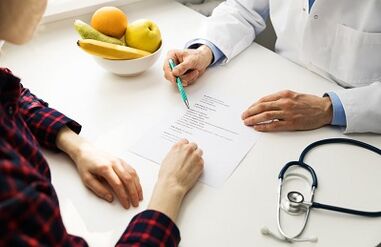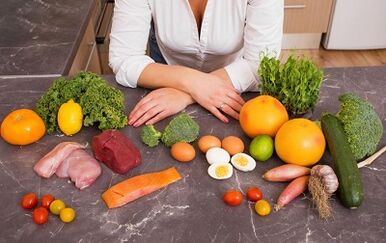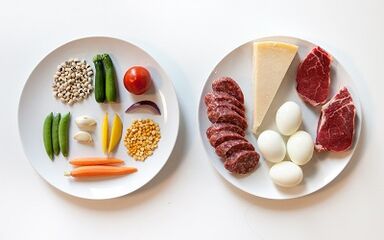
Gout is a disease associated with a metabolism violation, when an excessive quantity of uric acid accumulates in the body.Uric acid salt (sodium urates) begins to be deposited in the joints, which leads to their inflammation and other organs.
In the risk zone are people who use in large quantities of meat, spicy dishes that abuse alcoholic drinks.Other factors related to the development of the disease can be obesity, a sedentary lifestyle, nervous stress, heredity.
To confirm the diagnosis, a blood test is carried out for the uric acid content.During the analysis of the urine, the protein is diagnosed with it.
Most often, gout affects the joints near the thumbs.Gout attacks in most cases occur at night or early in the morning.The acute period of the disease can last up to seven days.The disease is chronic with repetitive relapses periodically.
Over time, attacks are repeated more and more often, the disease affects new joints and the destructive of the bones can occur.For more than four years more, dense yellowish tubers are formed under the joints for more than four years.From time to time, these formations can break out, whitish crumbs stand out.
A complication of gout can be the formation of kidney stones, hypertension, renal colic, damage to heart muscles and cardiac valves.
Diet with drop
The diet with the drop on the legs implies the refusal to eat food saturated with purines.To reduce the uric acid content in the body, it is necessary to considerably limit the consumption of animal proteins.
Certain types of meat and fish, offal, yeast, caviar, mushrooms, legumes, chocolate should be excluded.50% of purines are released in the broth when cooking, it is therefore not recommended to use broths.This applies to all broths (meat, fish, mushrooms).Simple carbohydrates and saturated fats also represent a certain danger.

In the treatment of gout, it is important to eat regularly, not to die of hunger and not to eat.Fasting, like excess nutrition, causes the release of uric acid.In the presence of an excess weight, extremely clear weight loss is not desirable.Food should be split, at least five meals a day.
It is recommended to organize fasting days in a week, fruits and vegetables.In the remaining days (2-3 times a week), the use of a small number of lean meat and fish products in boiled or cooked form is authorized, at the aggravation stage, they are completely excluded.
With drop, the use of a sufficient amount of liquid is required, while canned and sparkling drinks must be avoided.Alcohol is strictly prohibited at all doses, including drinks with low alcohol content.It is recommended to drink alkaline mineral water, natural berries and fruit juices (in particular citrus), compotes and fruit drinks (especially cranberry and lingonberry), the decoction of Roship.
Water prevents the formation of kidney stones.Sugar is not added to drinks because sugar increases the level of insulin in the blood, which slows the excretion of uric acid.Cocoa, strong tea, coffee is limited due to their effects on the nervous system.You should drink at least 1 cup of liquid 4 to 5 times a day before meals, the volume of liquid consumed should be 2.5 to 3 liters per day.
This diet must be respected constantly, in the event of exacerbations, the diet becomes more strict.
List of prohibited products
- Pork, Saindoux;meat of young animals and parts of the carcass of animals which give an adhesive broth (legs, cartilage, head);
- Buttons (meat, fish, mushrooms), meat sauces, cold weather;
- Meat extracts (packaging soups);
- Smoke meat meat;
- Landscaps (liver, heart, kidneys, brains) and dishes of the offal;
- Grasse varieties of fish, salted fish and fried (with exacerbation);caviar;Canned fish (sardins, sprats, sprats);
- Salt and net varieties of cheeses;
- Legumes (peas, beans, lentils, beans, soy);
- Cream, fermentation, yogurt;
- Spices and seasonings (mustard, horseradish, pepper, ketchup, tomato paste), with the exception of vinegar and bay leaves;
- Chocolate, cakes, cakes;
- Culinary fats and others of animal origin;
- Raspberries, figs, grapes and all the grape derivatives (raisins, wine);
- Hot paste products and leaflets;
- Products containing conservatives.
A list of products whose content in the food must be limited

- Salt;
- Sausages;
- Boiled meat and fish.Preference must be given to poultry, salmon, salmon, trout.They contain unsaturated fatty acids necessary for fat metabolism);
- Cauliflower, beet, sorrel, spinach, asparagus, rhubarb, celery, parsley, green onions, pepper, radish, radish, turnip, tomatoes;plums;
- Mushrooms (white, loads, mushrooms);
- Butter;
- Salting and marinades;
- Strong tea, coffee, cocoa.
Apart from exacerbation, lean meat and fish can be included in the menu 2 to 3 times a week in boiled and simmered form.The chops, the meatballs, the breaths are made from boiled meat or fish.Meat, fish, vegetables can be cooked or baked.From time to time, it is recommended to make short -term monodits or fasting days: vegetables, fruits (1.5 kg of vegetables or fruit per day), cottage cheese (400 gr. Cottage cheese and 500 ml of kefir).The day of rice unloading is useful: 75 gr.Rice is boiled in 750 ml of milk, also boiled at 250 gr.Sugar -free apples (in the form of a compote).Rice and apples are consumed during the three -doses day.
During exacerbations, meat and fish are completely excluded, fasting days are organized every two days.This alcalizes urine and increases the solidity of uric acid.
Recommended for consumer products
- Chicken, turkey, rabbit;
- Low fish varieties, seafood: calmar, shrimps;
- A bit bitter-milk products: Kéfir, cottage cheese, low cream with low fat content;
- Milk, addition to cereals and drinks;
- Eggs, chicken and quail (in any culinary transformation, with the exception of frying), omelettes;
- Coarse flour bread, wheat and rye;
- Cereals, pasta (in moderation);
- Nuts (hazelnuts, cedar, almonds, pistachios), seeds;
- All dried fruits (with the exception of raisins), honey;
- Vegetables: white cabbage, cucumbers, zucchini, carrots, potatoes, eggplant, dill;Freshly prepared vegetable caviar (zucchini, eggplant);
- Fruits: green apples, pears, citrus fruits, apricots, peaches, berries (with the exception of raspberries), avocados, pineapple, watermelons;
- Candies: marshmallows, marmalade, pastille, jam;
- According to drinks: lemon tea, green tea, coffee with milk, rosvi decoction, fruit and vegetable juice, fruit drinks, compounds, kvass, mineral water;
- Vegetable oil (olive, linen).
For the first, you can prepare vegetarian soups: Borsch, cabbage soup, Okroshka, peasant soup (with potatoes and cereals), dairy soups.
With an exacerbation of the disease at first, only the liquid is recommended, then the transition to a milk diet.






















